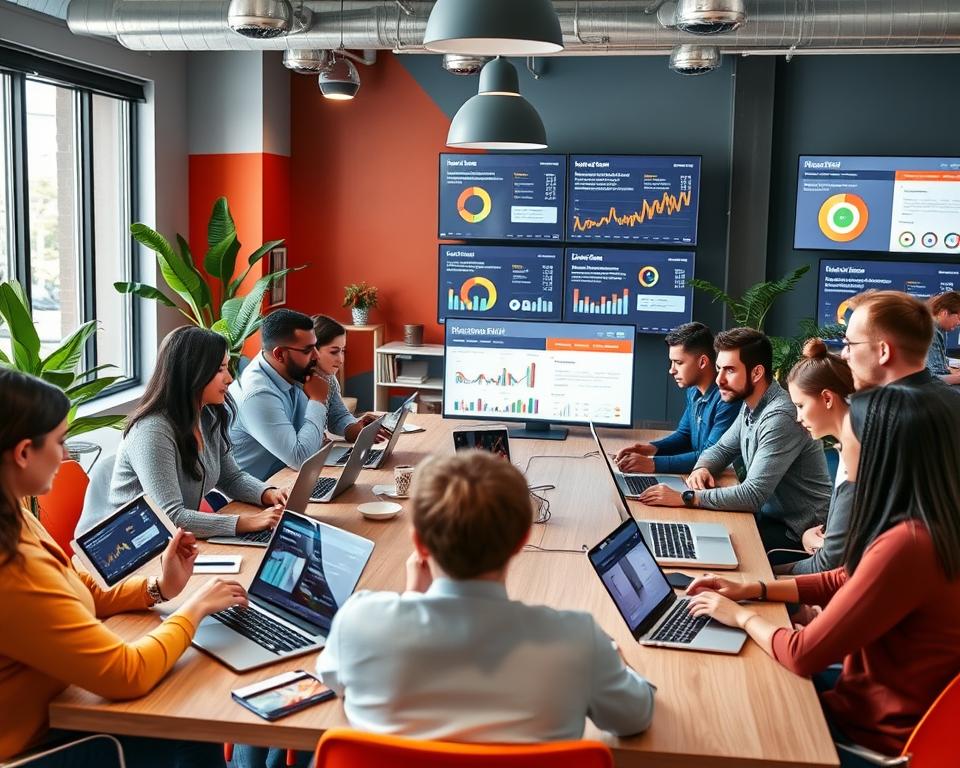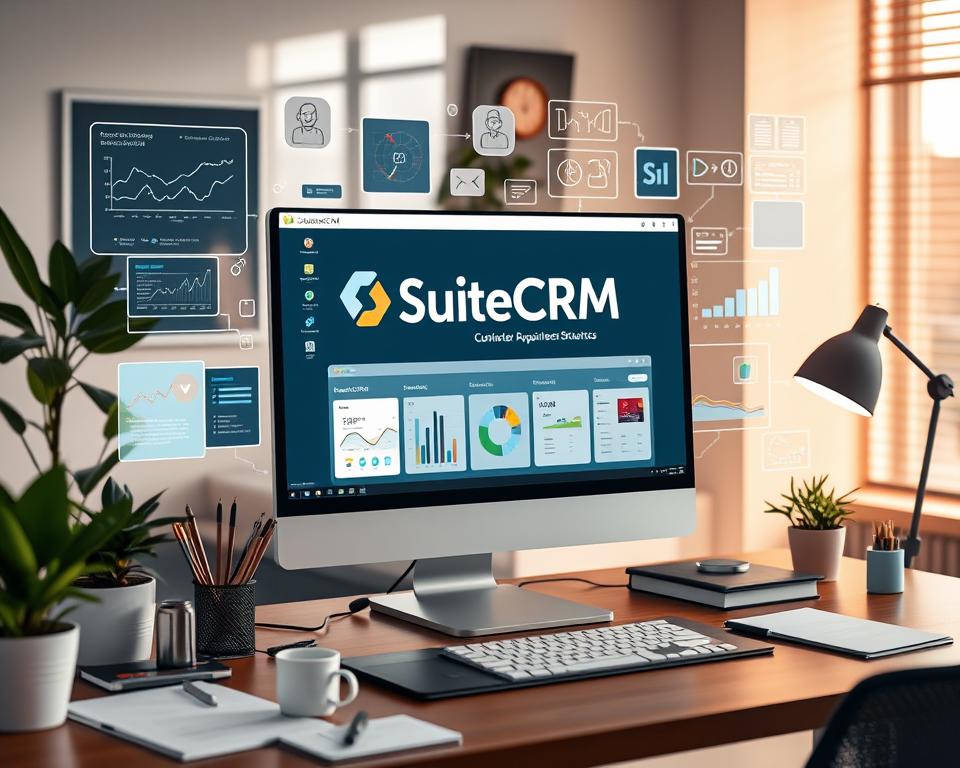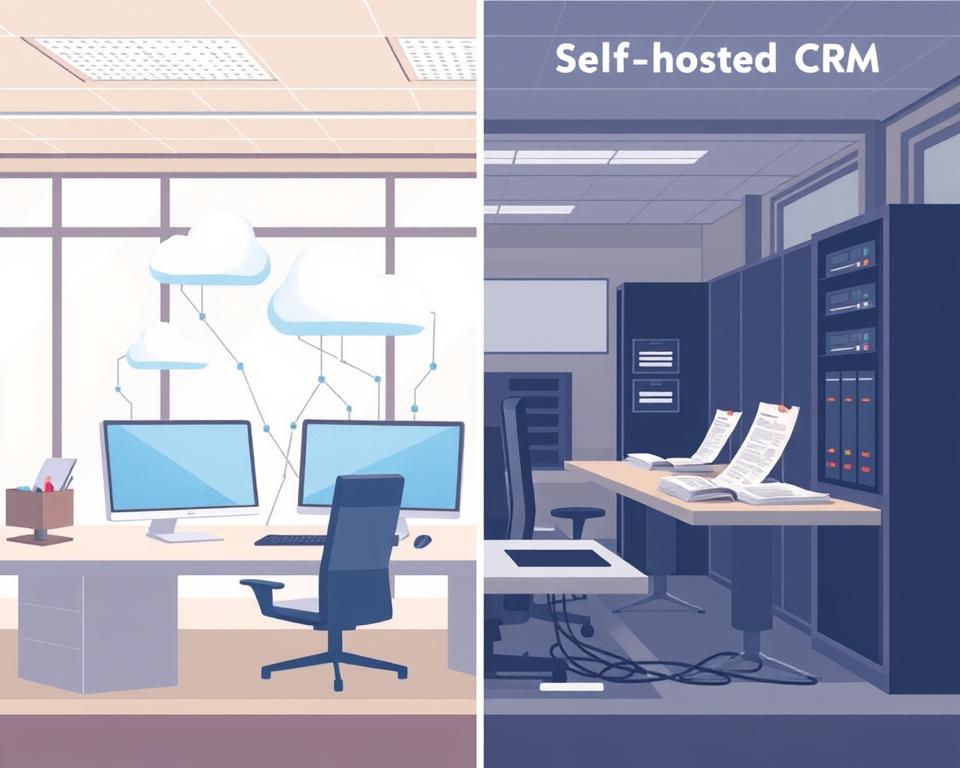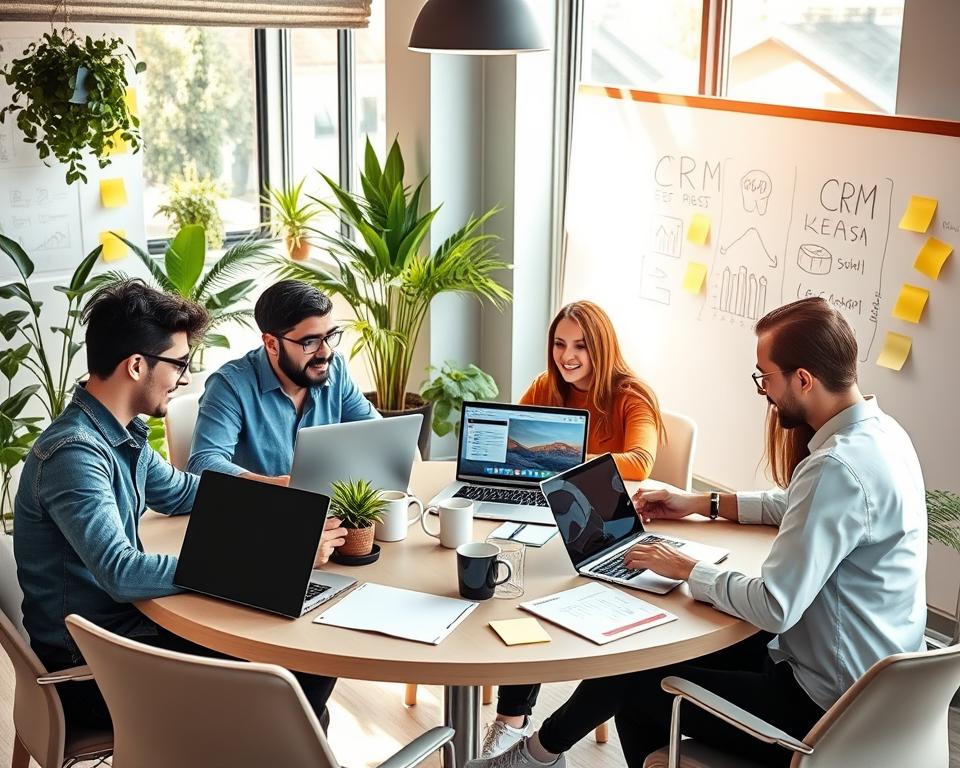In the world of customer relationship management (CRM) software, Salesforce has been a top choice. But, as businesses grow and change, they look for other CRM options. These alternatives offer different features, prices, and ways to connect with other systems.
If you’re a small business, a growing company, or need to fit with your current systems, there are many options. This article will guide you through the best CRM alternatives. They can help you find the right tool for managing your customer relationships.
Table of Contents
Key Takeaways
- Explore Salesforce alternatives to find a CRM solution that better aligns with your business needs, budget, and scalability requirements.
- Understand the importance of cost considerations, scalability, and integration capabilities when selecting a CRM platform.
- Discover comprehensive CRM alternatives, such as HubSpot, Zoho CRM, and Microsoft Dynamics 365, that offer unique features and pricing structures.
- Evaluate open-source and cloud-based CRM solutions as potential Salesforce replacements.
- Ensure the CRM solution you choose is tailored to your business size, from small enterprises to large-scale organizations.
Understanding the Need for Salesforce Alternatives
Businesses are always looking to grow and find better ways to manage their customer relationships. Salesforce is a big name in CRM, but its high cost and complex setup are turning many away. This has led to a search for CRM options that are more affordable and easier to use.
Cost Considerations in CRM Selection
Cost is a big reason why companies look for alternatives to Salesforce. Small and medium-sized businesses often find Salesforce too expensive. They want CRM solutions that are cheaper and help them grow their profits.
Scalability Requirements for Growing Businesses
As businesses get bigger, their CRM needs change. Salesforce might not be able to grow with them. Companies looking to expand quickly prefer CRMs that can scale easily and adapt to their needs.
Integration Capabilities with Existing Systems
It’s important for a CRM to work well with a company’s current systems. Salesforce might not fit perfectly with every business’s setup. This is why companies look for CRMs that can integrate smoothly with their existing tools and systems.
“Businesses today demand more flexibility, affordability, and seamless integration from their CRM solutions. Exploring alternatives to Salesforce can help organizations find the right fit for their unique needs and drive better overall performance.”
Key Features to Consider When Replacing Salesforce
When looking at Salesforce alternatives, focus on the CRM features you need. These include customer management and sales automation. They are crucial for your customer relationship strategy.
Contact management is a must. It helps keep customer info in one place. This includes contact details, past conversations, and purchase history. It’s key for offering personalized and quick service.
Sales forecasting is also important. Look for CRM solutions with strong sales pipeline management. They should also offer predictive analytics. This helps your team make smart decisions and use resources well.
Marketing automation is another vital feature. It makes your marketing efforts smoother and boosts customer interaction. Choose CRM platforms that work well with your marketing tools. They should help with email campaigns, social media, and tracking campaign success.
By looking closely at these CRM features, you can find a great alternative to Salesforce. It will improve your customer management and sales automation. This will help your business succeed in the long run.
HubSpot CRM: A Comprehensive Alternative
Businesses are looking for a better option than Salesforce. HubSpot CRM is a strong and easy-to-use choice. It combines marketing automation with customer relationship management in a unique way.
HubSpot’s Marketing Integration Benefits
HubSpot CRM shines with its marketing tool integration. It brings sales and marketing together. This makes it easier to get new customers and keep them.
Teams can work better on lead nurturing, audience segmentation, and personalized content. This helps them reach more people effectively.
Pricing Structure and Plans
HubSpot CRM has a pricing plan for every business size. The free version gives small and medium businesses a great start. It doesn’t cost a lot upfront.
For more features, HubSpot’s paid plans are affordable. This makes it a good choice compared to Salesforce’s high prices.
User Interface and Learning Curve
HubSpot CRM is easy to use and navigate. It’s designed for the user, with a clean dashboard. This makes daily tasks simpler.
HubSpot also offers lots of learning resources. This helps teams learn and use the CRM quickly.
“HubSpot CRM has been a game-changer for our business. The marketing integration features have helped us nurture leads more effectively, leading to a significant increase in our conversion rates.”
– Jane Doe, Marketing Manager at ABC Corporation
Zoho CRM: Affordable Enterprise Solution
Zoho CRM is a top choice for businesses looking for a cost-effective CRM solution. It’s a great alternative to Salesforce, offering a wide range of features for growing companies. These features help streamline customer relationships.
Zoho CRM’s pricing is very competitive, starting at just $12 per user per month. This makes it perfect for businesses on a budget. It also grows with your company, adapting to your needs as your team and customer base expand.
One big plus of Zoho CRM is how well it works with other Zoho tools like Zoho Books and Zoho Invoice. This integration helps businesses run smoothly, improving efficiency and keeping data in sync across departments.
| Feature | Zoho CRM | Salesforce |
|---|---|---|
| Pricing (starting from) | $12 per user per month | $25 per user per month |
| Customization Options | Extensive | Extensive |
| Integration Capabilities | Robust, with Zoho suite | Extensive, with numerous third-party apps |
| Mobile Access | Fully mobile-responsive | Dedicated mobile apps |
Zoho CRM is easy to use, making it great for businesses of all sizes. Its affordable price and strong features make it a solid choice for those looking for a Salesforce alternative.
Microsoft Dynamics 365: Enterprise-Grade Alternative
Businesses looking to go beyond Salesforce find Microsoft Dynamics 365 a great choice. This Microsoft Dynamics 365 platform works well with Microsoft Office. It makes teams work more efficiently together.
Integration with Microsoft Office Suite
Microsoft Dynamics 365’s big plus is how well it works with Microsoft Office. Users can manage customer data right from Microsoft Outlook, Excel, and other Office apps. This makes their workday easier and more productive.
Advanced Analytics and Reporting
Microsoft Dynamics 365 has top-notch CRM analytics. It helps businesses understand their customer data better. The platform’s detailed reports give a clear view of sales, marketing, and customer service. This helps make better decisions based on data.
Customization Options
Microsoft Dynamics 365 lets businesses customize it to fit their needs. You can change how it looks and works. This makes it easy to fit into your company’s systems and processes.
| Feature | Microsoft Dynamics 365 | Salesforce |
|---|---|---|
| Office Integration | Seamless integration with Microsoft Office suite | Limited integration with Microsoft Office |
| CRM Analytics | Advanced analytics and reporting capabilities | Basic reporting and analytics features |
| Customization | Highly customizable to fit business needs | Limited customization options |
“Microsoft Dynamics 365 provides a seamless CRM experience that leverages the power of the Microsoft ecosystem, empowering businesses to transform their customer relationship management strategies.”
Freshsales: Modern Sales-Focused CRM
Freshsales CRM is a top choice for sales teams. It’s a modern, sales-focused CRM that’s different from Salesforce. It’s designed to make sales processes smoother and help teams work better together.
Freshsales shines with its sales automation features. It uses AI to automate tasks, so sales teams can spend more time with customers. It offers tools like lead scoring and activity capture, giving sales teams valuable insights to boost their work.
- Intuitive user interface for easy adoption
- Comprehensive lead management and pipeline tracking
- Intelligent lead scoring and prioritization
- Automated sales activities and email sequences
- Advanced reporting and analytics for data-driven decision-making
Freshsales is all about helping sales teams succeed. It’s a breath of fresh air compared to traditional CRMs. Its focus on sales and AI insights makes it a great pick for businesses looking to improve their sales and grow their revenue.
“Freshsales has been a game-changer for our sales team. The automation and insights it provides have helped us close more deals and focus on what matters most – building strong relationships with our customers.”
Open Source CRM Solutions
In the world of customer relationship management (CRM) software, open source options are gaining ground. SuiteCRM stands out as a community-driven open source CRM. It offers a flexible and customizable way to engage with customers.
SuiteCRM Features and Benefits
SuiteCRM is a powerful open source CRM with a wide range of features. It helps streamline sales, marketing, and customer service. Businesses can customize it to fit their needs with many integrations and customizations.
It has tools for managing leads, tracking opportunities, and advanced reporting. SuiteCRM is designed to improve customer relationships.
Community Support and Development
- SuiteCRM has a strong community of developers and users who help it grow.
- Its open source nature means businesses can tap into the community’s knowledge. They get access to many resources, plugins, and customizations.
- This community support keeps SuiteCRM up-to-date and evolving. It meets the changing needs of businesses in the open source CRM world.
For those looking for a flexible, cost-effective, and community-supported CRM, SuiteCRM is a great choice. Its strong features and active community make it a top pick in the open source CRM market.
Cloud-Based vs. Self-Hosted CRM Options
Businesses have two main choices for customer relationship management (CRM): cloud-based and self-hosted CRM solutions. Each has its own benefits and things to think about. These can affect how well a CRM works for a company.
Cloud-based CRM solutions, like HubSpot CRM and Zoho CRM, are managed by the provider. This means no need for your own servers or IT team. Cloud CRMs are flexible, easy to use from anywhere, and often cheaper upfront.
On the other hand, on-premise CRM or self-hosted solutions need you to handle the setup and upkeep. They offer more control over data and can be customized. But, they cost more and require a lot of IT work.
| Factor | Cloud CRM | On-Premise CRM |
|---|---|---|
| Upfront Costs | Lower | Higher |
| Ongoing Costs | Subscription-based, predictable | Hardware, software, and IT maintenance |
| Scalability | Highly scalable | Limited by on-site infrastructure |
| Accessibility | Accessible from anywhere with internet | Limited to on-site access |
| Data Security | Managed by provider, dependent on provider’s policies | Managed by the organization, more control over data |
| Customization | Limited by provider’s capabilities | More customization options |
When picking between cloud and self-hosted CRMs, think about what you need. Look at your IT setup, budget, and future plans. This will help you choose the best CRM for your business.
Small Business-Focused CRM Alternatives
Finding a good customer relationship management (CRM) for small and medium-sized businesses (SMBs) can be tough. But, there are many Salesforce alternatives made just for SMBs. They offer great features at affordable prices.
Budget-Friendly Solutions
Cost is a big deal for small businesses when it comes to CRM. Luckily, there are many affordable options. Zoho CRM, Freshsales, and HubSpot CRM are some examples. They have different pricing plans to fit any budget.
Essential Features for SMBs
- Lead and contact management
- Automated sales pipelines
- Intuitive user interface
- Integration with popular business tools
- Comprehensive reporting and analytics
- Mobile accessibility
When looking at CRM options, focus on what’s important for SMBs. Features like lead management and sales pipelines are key. They help with customer engagement and business growth.
Exploring these alternatives can help small businesses find the right CRM. It should match their budget and needs. This way, they can manage customer relationships well and grow their business.
Enterprise-Level Salesforce Alternatives for Customer Relationship Management
As businesses grow, they need a strong CRM solution. Salesforce is popular, but there are other top choices. These alternatives offer great features, customization, and integration.
Looking for a CRM for a big company? You need something flexible, scalable, and can handle complex needs. Here are some top picks:
- Microsoft Dynamics 365: This CRM works well with Microsoft Office. It has advanced analytics and lots of customization options.
- Oracle CRM: It’s packed with features for managing customer data and automating sales and marketing. It also has top security and compliance.
- SAP Customer Experience: SAP’s CRM is great for big, complex companies. It combines customer focus with SAP’s ERP power.
| CRM Solution | Key Features | Pricing |
|---|---|---|
| Microsoft Dynamics 365 |
|
Starting at $65 per user, per month |
| Oracle CRM |
|
Pricing available upon request |
| SAP Customer Experience |
|
Pricing available upon request |
Choosing a CRM for a big company? Think about what you need, your budget, and support. This ensures a smooth transition and gets the most from your CRM.
Mobile CRM Solutions and Accessibility
In today’s world, being able to work from anywhere is key. This is especially true for managing customer relationships. Mobile-friendly CRM apps are now vital for keeping up with customer interactions and staying productive.
The growth of mobile CRM has changed how teams work together. Even when they’re not at their desks, these apps let them access important data. They can update records and work together easily from their phones or tablets.
- Increased Mobility: Mobile CRM apps let users check customer info, log sales, and answer questions anywhere. This boosts their productivity and quickness to respond.
- Improved Collaboration: Mobile CRM solutions make it easy for teams to share data and talk in real-time. This helps them make fast decisions and have better talks with customers.
- Enhanced Accessibility: Mobile CRM apps help employees stay productive and connected, no matter where they are.
When looking for CRM apps like Salesforce, focus on mobile-friendly features. Look for easy-to-use interfaces, smooth data syncing, and strong security. These are key for modern, mobile CRM solutions.
| Mobile CRM Feature | Benefit |
|---|---|
| Offline Access | Users can see and change customer info even without internet. This keeps work going smoothly. |
| Geolocation Tracking | Sales reps can log their location and activities. This helps with territory management and documenting client visits. |
| Voice-to-Text Capabilities | Users can take notes, log calls, and update records with voice commands. This makes entering data easier on the go. |
Looking for alternatives to Salesforce? Having strong, mobile-friendly CRM solutions can really help. They boost productivity, teamwork, and access for remote and mobile workers.
Data Migration Strategies from Salesforce
Switching to a new CRM system can feel overwhelming, especially when moving data from Salesforce. It’s important to plan well and execute carefully for a smooth CRM data migration. Let’s look at the main strategies and best practices for a successful move.
Planning the Migration Process
The first step in moving data from Salesforce is to make a detailed migration plan. This plan should cover:
- Do a full check of your Salesforce data to know what needs to be moved.
- Find out which data types, fields, and connections are important to move.
- Check if your new CRM system can handle the data from Salesforce.
- Make a timeline and project plan with milestones to keep things on track.
- Set up a test and check process to make sure the data is right and complete.
Common Migration Challenges
While planning is key, knowing the possible problems is also important. Some common issues include:
- Problems with data quality, like duplicate records or missing info.
- Getting custom fields, workflows, or other Salesforce features to work in the new CRM.
- Keeping historical data, like sales records and customer interactions, safe.
- Managing user permissions and access rights when switching to the new system.
- Dealing with downtime and disruptions to your business during the move.
By knowing these challenges and planning ahead, you can reduce risks and make the CRM data migration from Salesforce to your new CRM a success.
Security and Compliance Considerations
When looking for a CRM, CRM security and data protection are key. Businesses deal with sensitive customer info. So, following GDPR rules is very important.
It’s vital to check a CRM’s security features. Look for strong encryption, secure storage, and strict access controls. Also, check if the provider meets GDPR standards and values data privacy.
- Check the CRM’s encryption and storage
- See if it follows GDPR rules
- Make sure it has strong access controls
- Choose CRMs known for keeping data safe
By looking closely at a CRM’s security and compliance, you keep your data safe. This lets you focus on giving great customer service.
| Feature | HubSpot CRM | Zoho CRM | Microsoft Dynamics 365 |
|---|---|---|---|
| Encryption | 256-bit AES encryption | 256-bit AES encryption | 256-bit AES encryption |
| GDPR Compliance | Fully compliant | Fully compliant | Fully compliant |
| User Access Controls | Granular permissions | Granular permissions | Granular permissions |
Conclusion
Choosing the right CRM solution to replace Salesforce is a big decision. You need to think about your business’s specific needs and goals. Look at the cost, how it can grow, how well it integrates, and if it fits your sales, marketing, and customer service needs.
Looking at other CRM options like HubSpot, Zoho, Microsoft Dynamics 365, and Freshsales can help. They offer good value and work well with your current systems. Also, open-source and cloud-based CRMs are flexible and can grow with your business.
The key is to match your CRM with your business goals, what your users need, and your budget. By comparing Salesforce with other options, you can find a CRM that helps your team. It will make managing customer relationships easier and help your business grow over time.



















